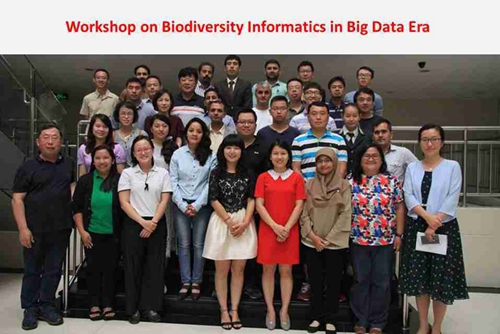On Sept. 4-14, Workshop on Biodiversity Informatics in Big Data Era was successfully held in Institute of Botany, Chinese Academy of Sciences (IBCAS). The workshop was funded by Bureau of International Co-operation, CAS, Beijing Office, UNESCO and Chinese National Committee for MAB, UNESCO, hosted by Biodiversity Committee, CAS (BC-CAS), and organized by IBCAS, It was a two-week workshop attended by 45 participants from 21 Belt and Road countries, such as Bangladesh, Philippines, Pakistan, Sri Lanka, Thailand, Uzbekistan, Vietnam and so on.
The opening ceremony was chaired by Prof. Keping Ma, the Secretary General of BC-CAS. Prof. Xiaojuan Feng, an Assistant Director of the Institute of Botany, CAS, was invited to deliver a welcome speech.
Considering the framework of biodiversity informatics knowledge and technology, the workshop focused on biodiversity data collection, management, sharing and mining. It was carried out in the forms of training courses, practices and a field trip.
Ten experts from Institute of Botany, Institute of Zoology, and Research Center for Eco-Environmental Sciences, CAS, were invited to give lectures on biodiversity data collection. New monitoring technologies with application of infra-red camera, satellite tracker, near-surface remote sensing on forest, animals, birds and insects were introduced.
Summaries on global and national online biodiversity resources, such as Global Biodiversity Information Facility (GBIF), Catalogue of Life (CoL), National Specimen Information Infrastructure (NSII) and so on were presented. Biodiversity informatics related standards and tools, information systems of protected areas, virtual herbaria and museums, and red lists were shared by experts from different institutions. Then, the participants visited herbarium of IBCAS, and had the firsthand experiences on specimen digitization technology.
In the session of data analysis and application, R language as a basic data analysis tool was mentored. Biodiversity data analysis tools and website development was lectured by experts from CAS institutes. It strengthened participants’ understanding of new methods and progress in related fields.
During the workshop, participants visited the 20-ha warm temperate deciduous broadleaved forest plot in Dongling Mountain in Beijing, which helped them with a better understanding of monitoring via forest dynamics plot, seed traps, and infra-red camera, etc.
In the closing ceremony on Sept. 14, Dr. Kequan Pei, the Director of General Office, IBCAS awarded the certificates to the participants.
This workshop was a national technology promotion project for developing countries in the Belt and Road area. Project team members did a good job in preparation and arrangement. The experiences and practices of biodiversity conservation research and information management of China delivered at the workshop would promote biodiversity researches and conservation in the Belt and Road countries. Also, it will strengthen the international cooperation between the Belt and Road countries and CAS in the future.

On Sept. 4-14, Workshop on Biodiversity Informatics in Big Data Era was successfully held in Institute of Botany, Chinese Academy of Sciences (IBCAS). The workshop was funded by Bureau of International Co-operation, CAS, Beijing Office, UNESCO and Chinese National Committee for MAB, UNESCO, hosted by Biodiversity Committee, CAS (BC-CAS), and organized by IBCAS, It was a two-week workshop attended by 45 participants from 21 Belt and Road countries, such as Bangladesh, Philippines, Pakistan, Sri Lanka, Thailand, Uzbekistan, Vietnam and so on.
The opening ceremony was chaired by Prof. Keping Ma, the Secretary General of BC-CAS. Prof. Xiaojuan Feng, an Assistant Director of the Institute of Botany, CAS, was invited to deliver a welcome speech.
Considering the framework of biodiversity informatics knowledge and technology, the workshop focused on biodiversity data collection, management, sharing and mining. It was carried out in the forms of training courses, practices and a field trip.
Ten experts from Institute of Botany, Institute of Zoology, and Research Center for Eco-Environmental Sciences, CAS, were invited to give lectures on biodiversity data collection. New monitoring technologies with application of infra-red camera, satellite tracker, near-surface remote sensing on forest, animals, birds and insects were introduced.
Summaries on global and national online biodiversity resources, such as Global Biodiversity Information Facility (GBIF), Catalogue of Life (CoL), National Specimen Information Infrastructure (NSII) and so on were presented. Biodiversity informatics related standards and tools, information systems of protected areas, virtual herbaria and museums, and red lists were shared by experts from different institutions. Then, the participants visited herbarium of IBCAS, and had the firsthand experiences on specimen digitization technology.
In the session of data analysis and application, R language as a basic data analysis tool was mentored. Biodiversity data analysis tools and website development was lectured by experts from CAS institutes. It strengthened participants’ understanding of new methods and progress in related fields.
During the workshop, participants visited the 20-ha warm temperate deciduous broadleaved forest plot in Dongling Mountain in Beijing, which helped them with a better understanding of monitoring via forest dynamics plot, seed traps, and infra-red camera, etc.
In the closing ceremony on Sept. 14, Dr. Kequan Pei, the Director of General Office, IBCAS awarded the certificates to the participants.
This workshop was a national technology promotion project for developing countries in the Belt and Road area. Project team members did a good job in preparation and arrangement. The experiences and practices of biodiversity conservation research and information management of China delivered at the workshop would promote biodiversity researches and conservation in the Belt and Road countries. Also, it will strengthen the international cooperation between the Belt and Road countries and CAS in the future.

